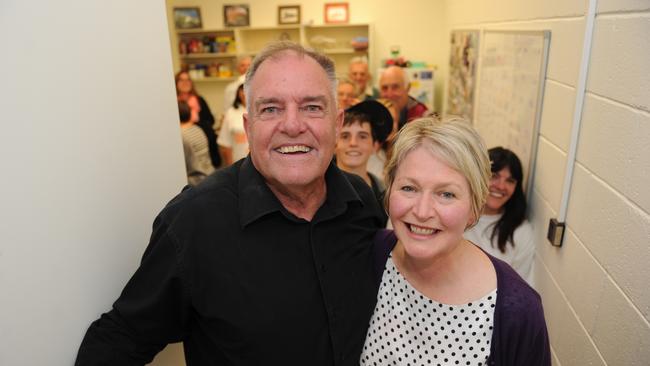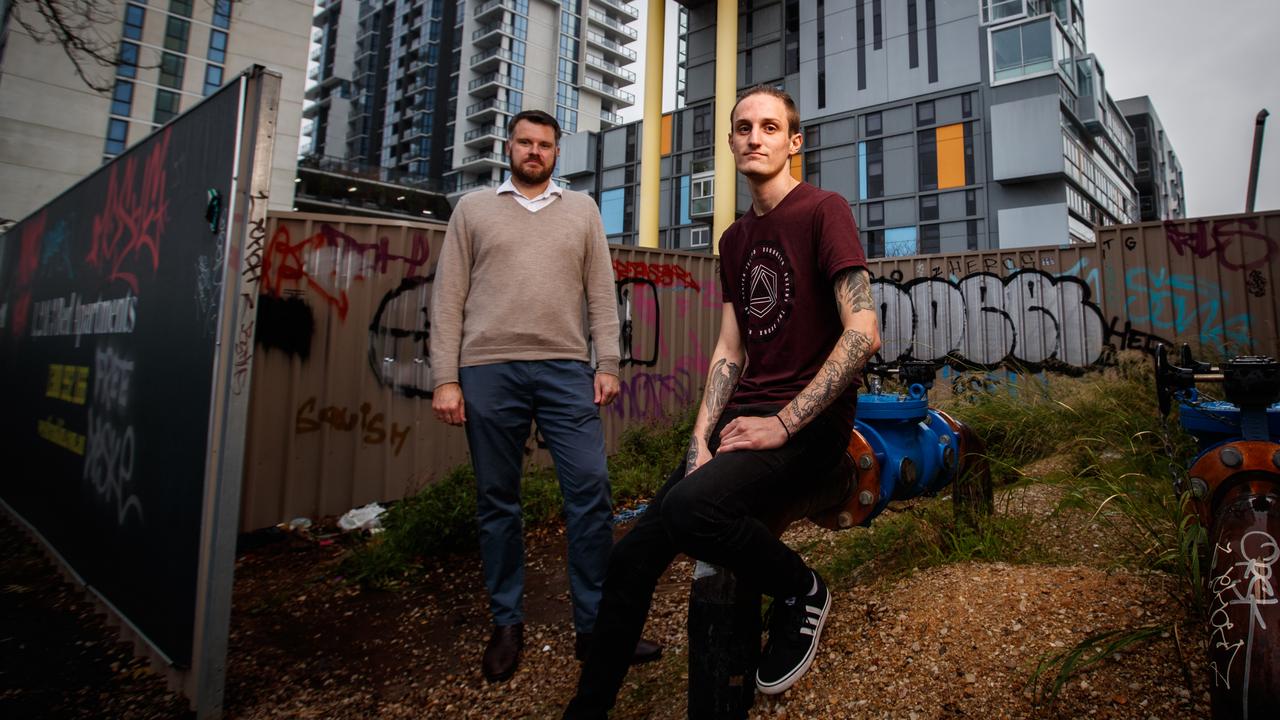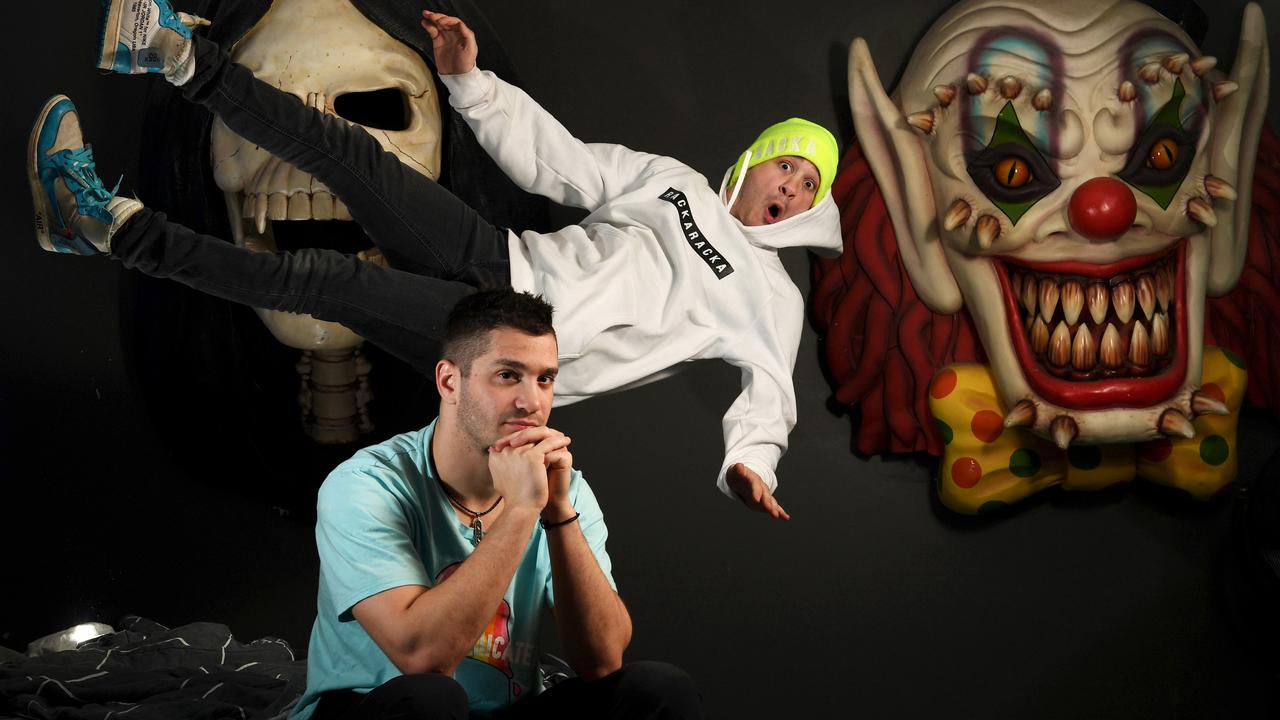“I thought we would have more time”
LYN Such on love, life and regrets with soulmate Bob, a fair-minded fighter who was devoted to politics right up until the end.

SA Weekend
Don't miss out on the headlines from SA Weekend. Followed categories will be added to My News.
LOOKING back, it was the little things that didn’t seem right – a slurred word, a sudden sensitivity to light, an indecisiveness that was unusual for a politician of 25 years.
Then again, it had been a tough few months for Bob Such as he fought to retain his seat in the cliffhanger March state election. At 70, he was no longer a young man, and perhaps these glitches were just due to a mix of age and work pressure that had taken a toll.
So Lyn, his wife of 18 years, didn’t worry too much at first. She put the occasional example of uncharacteristic behaviour down to exhaustion. After all, he’d been to see his GP just four days after the election, and been given the all-clear.
But the little things didn’t go away. Instead, they became more frequent. Call it intuition, call it caution, or just call it common sense, eventually Lyn convinced her husband to go back to the doctor.
On Friday afternoon, six days after the March 15 election returned him as the independent Member for the seat of Fisher, she dropped Bob at the Flinders Medical Centre for a scan, gave him a quick wave and headed home to get a few household chores done.
An hour later the phone rang.
“It was how he sounded, he just sounded so scared,” Lyn recalls, tears welling up at the memory. “He said they’d found a lesion on his brain.”
Too shaken to drive, Lyn asked her sister to rush her back to the FMC where she accompanied Bob for an MRI scan which revealed the extent of his illness.
There, pressing on the part of the brain predominantly responsible for speech, was a large, inoperable brain tumour. “Once you saw the MRI it was just devastating,” Lyn says. “A glioblastoma multiforme – it’s the worst kind.”
But this was a crisis that could not be played out in private. As the sudden calamity enveloped the private world of Bob and Lyn, South Australian politics was at its own crossroads, as the tight election result left Labor with 23 seats and the Liberals with 22.
Bob and fellow independent Geoff Brock, in Port Pirie, were centre stage. If both sided with the Liberals they would have taken Government and made Steven Marshall the new premier. But Bob had not made up his mind which way to jump. He decided to take indefinite sick leave as he prepared for months of intensive radiotherapy and chemotherapy.
While the public were unaware of just how serious his illness was for some time, on that weekend Bob asked Lyn to tell Premier Jay Weatherill and Steven Marshall that he was ill.
The news that Bob was out of action left fellow independent Brock with the responsibility of effectively choosing the state’s next Government. Weatherill reacted quickly, making a dash to Port Pirie, in Brock’s electorate of Frome, where he convinced him over a Hawaiian pizza to go with Labor. The pressure was off Bob to pick a side, but a different kind of battle loomed.
Bob Such started his political career in November 1989 when he won the southern suburbs seat of Fisher for the Liberals. Over a decade later he quit the party following a tumultuous few years – but the people of Fisher kept him on as an independent.
It was during his stint for the Libs that Lyn and Bob met. They’d known each other for years before they were married when they had both worked at the old SA College of Advanced Education campus at Underdale, the genesis of Bob’s desire to improve educational and employment opportunities for young South Australians.
After both marrying and separating from their first spouses, the pair found each other again and began dating in early 1995. Lyn, now 60, describes it as a “friendship that turned into love”.
The couple married late the next year, amid some criticism it was too serious too soon. There was a need for urgency though. “One of the reasons we got married when we did, is because we wanted to try for a family,” says Lyn, who was 41 at the time. “I couldn’t have children (previously) so it was IVF (with Bob). We were under pressure because of my age.”
The couple tried three rounds of IVF without success and Lyn holds it as one of her greatest regrets.
Now, sitting in the lounge room of the Coromandel Valley home the couple shared, she is surrounded by reminders of her late husband. Boxes and papers from his electorate office are piled high. Staff only recently cleared out the office and took his name off the windows and doors, prompting Lyn to “burst into tears” at the reminder that he was gone.
On the mantelpiece in the lounge room is an official headshot of the Member for Fisher, standing next to photos of grandchildren. On the table in front of us is a snap from Lyn and Bob’s wedding day – she in a smooth blush pink gown, he in a three-piece suit.
As she looks around at all these reminders, it’s clear how much Lyn misses the man she shared this home with.
“To the end he still looked like Bob,” she says, looking at the wedding photo. “It was hard to imagine what that dreadful tumour was doing, it was just wicked. Thankfully he wasn’t in excruciating pain … he never had a seizure. But he went off eating. It made him very unwell.”
In hindsight, there were signs that cancer was slowly eating into the former academic’s brain. His speech was slower. He had trouble making simple decisions.
The couple were so busy campaigning around Fisher that Lyn says she didn’t realise something was seriously wrong until well after polling day.
After taking down his corflute posters and meeting with Weatherill and Marshall – hounded by media all the way – Bob had taken the time for a check-up of blood pressure and sugar levels with his GP on the Wednesday following the Saturday election. No major concerns were raised.
Two days later, an increasingly-concerned Lyn called back to make another appointment. “It’s still hard to put my finger on, he just didn’t seem that right,” she says.
“Before the election to be honest I didn’t see a lot of him, he was out and about and I was letterboxing too. His only symptoms were a bit of slurring of speech. He just couldn’t seem to make up his mind about things. I know that used to frustrate him if other people did it,” she laughs.
“Just little odd things – we all put it down to tiredness, pressure.”
It would be fair to wonder whether the strains and stresses of 25 years of political life had contributed to the illness.
Lyn describes the first years of her marriage to Bob – then a Minister in the Liberal Government – as tumultuous. About three months after they took their vows, Bob was dumped from the ministry. “It was a terrible time, even before we got married he was under a lot of pressure,” Lyn recalls.
“He knew he was going to be dumped. To be undermined from within, not from the Opposition, it’s hard to get your head around. It really hurt him.”
A former administration clerk, Lyn admits she wasn’t really interested in politics and had no idea what she was signing up for by marrying a politician.
“I was so naive,” she says. “I guess I was drawn in, to a degree. (But) mainly he didn’t want me getting caught up with the pressure. He thought just because I married an MP, it wasn’t my fault.”
Still, as Bob’s sounding board over almost two decades, Lyn was exposed to all the shades of political life – good and bad. He sought her opinion on some things, and mostly they agreed.
Both Lyn and Bob felt the Liberals targeted their former colleague pointedly in this year’s election campaign, “pouring” money and time into the Fisher vote in a bid to get Liberal candidate Sam Duluk over the line.
While she says there are some – mostly new – Liberals she’s impressed by, Lyn’s disappointment with those from Bob’s era is clear. “Leaving the Libs was just the making of him,” she says of her late husband’s decision to stand as an independent. “He was never more sure of himself. (Being in the Liberal Party) was just like a big monkey on his back. In a way, they didn’t deserve him, his ability and his vision. (Quitting) was like the shackles came off. He could stick his head up with issues.”
On that crucial last decision though – who to support to form Government – Bob had kept mum. Lyn believes he had made up his mind but, in the midst of battling the cancer, it fell down the list of priorities.
She’s “pretty sure” she knows which way he would have gone but “I’ll never tell anybody”, she says, only hinting that “it was really for a stable government”.
“He was his own man,” she says. “It was a terrible lot of pressure, as Geoff Brock would have felt too.”
Yet for all this pressure, Lyn does not believe it played a role in Bob’s cancer. In fact, she thinks, it was politics that kept him going. “They couldn’t really believe that with that (size tumour) he had won the election,” Lyn says. “The neurosurgeon said it just shows you his constitution, he just had a line to get across and he did it. (After the diagnosis) all he wanted to do was get back to Parliament. Even in the depths of feeling revolting he just wanted to keep going.”
Bob was well-known for his relentless offering of reform ideas to the Parliament. While on extended sick leave, he continued to write letters to the editor of The Advertiser and had been working with Labor MP Steph Key and Liberal MP Duncan McFetridge on a new voluntary euthanasia Bill – an issue he had consistently pushed throughout his career.
The Bill had been drafted and consulted on but there was not enough time to debate and approve it in the final days of Parliament for this year, which wrapped up this week.
The Premier and Opposition Leader have pledged to revisit ideas proposed by Bob, including reforms to electoral laws and parliamentary processes. In October, the Premier announced MPs will be subject to an official code of conduct that sets standards for dealing with the public and respecting parliamentary privilege.
He tabled a statement of 12 principles, originally proposed by the independent MP, including requiring MPs to act with civility, respect freedom of speech within Parliament and not to misuse this right and declare all conflicts of interest and not raise or vote on any matter or use official information for private benefit.
For her part, Lyn has urged MPs to pick up where Bob left off. She would like to see “solid reform” of parliamentary processes, including requiring ministers to answer questions with relevant information during Question Time and allocating more time for Private Member’s Business raised by non-government MPs.
“I think they really need to clean up the time wasted in Parliament,” she says.
Today voters in Fisher go back to the polls to elect a new MP. Lyn has declared her support for newcomer independent candidate Daniel Woodyatt, a Crown Solicitor’s lawyer and young father.
While Mr Woodyatt never met Bob, he had applied to work in his electorate office.
He is up against Liberal Heidi Harris, a previous state and federal election candidate, and Labor’s Nat Cook, an anti-violence campaigner.
Lyn’s reasoning for supporting Mr Woodyatt is simple – she’d like to see Fisher remain out of the hands of the major parties. “I’m not saying Dan will be Bob – none of them will be Bob – but it would just be good if there could still be an independent here,” she says.
“People get very despondent with the type of politicians coming through the system. They don’t relate to them. They get so insular sometimes.
“People out there, doing it hard, they’re wanting much more from their politicians.”
Out in the electorate of Fisher, Lyn has been overwhelmed by the outpouring of respect for her late husband – from shoppers in the supermarket to the blokes collecting the rubbish bins.
She believes his experience, though terribly “unfair”, has shown that “all pollies are human”.
“They have hurts, disappointments,” she says. “We had hopes and dreams just like everybody else.”
Bob never gave up. He managed to attend Parliament once after the election – a shaky version of his former presence after making a great effort to be present for the opening day on Tuesday, May 6.
Bob had tears in his eyes as MPs from both side of politics lined up to greet him. At the time he said he planned to return to Parliament “God willing” but it would be the last day he would spend in his “office” of a quarter of a century.
He passed away at Daw House Hospice on Saturday, October 11 – almost seven months after diagnosis – with Lyn and one of his three adult sons by his side.
In the months following his diagnosis, Bob underwent five radiotherapy treatments a week, in six week blocks, and took chemotherapy drugs every night. When doctors increased the medication the effect was “just hideous”, Lyn remembers.
But despite the seriousness of his illness, he never knew the magnitude of the fight he was facing. It would have been too much to cope with, Lyn believes.
“Bob didn’t see the scans,” she says. “He never wanted to know. He didn’t want to be overwhelmed. “I knew,” she adds. “But I thought we’d have more time.” ●



